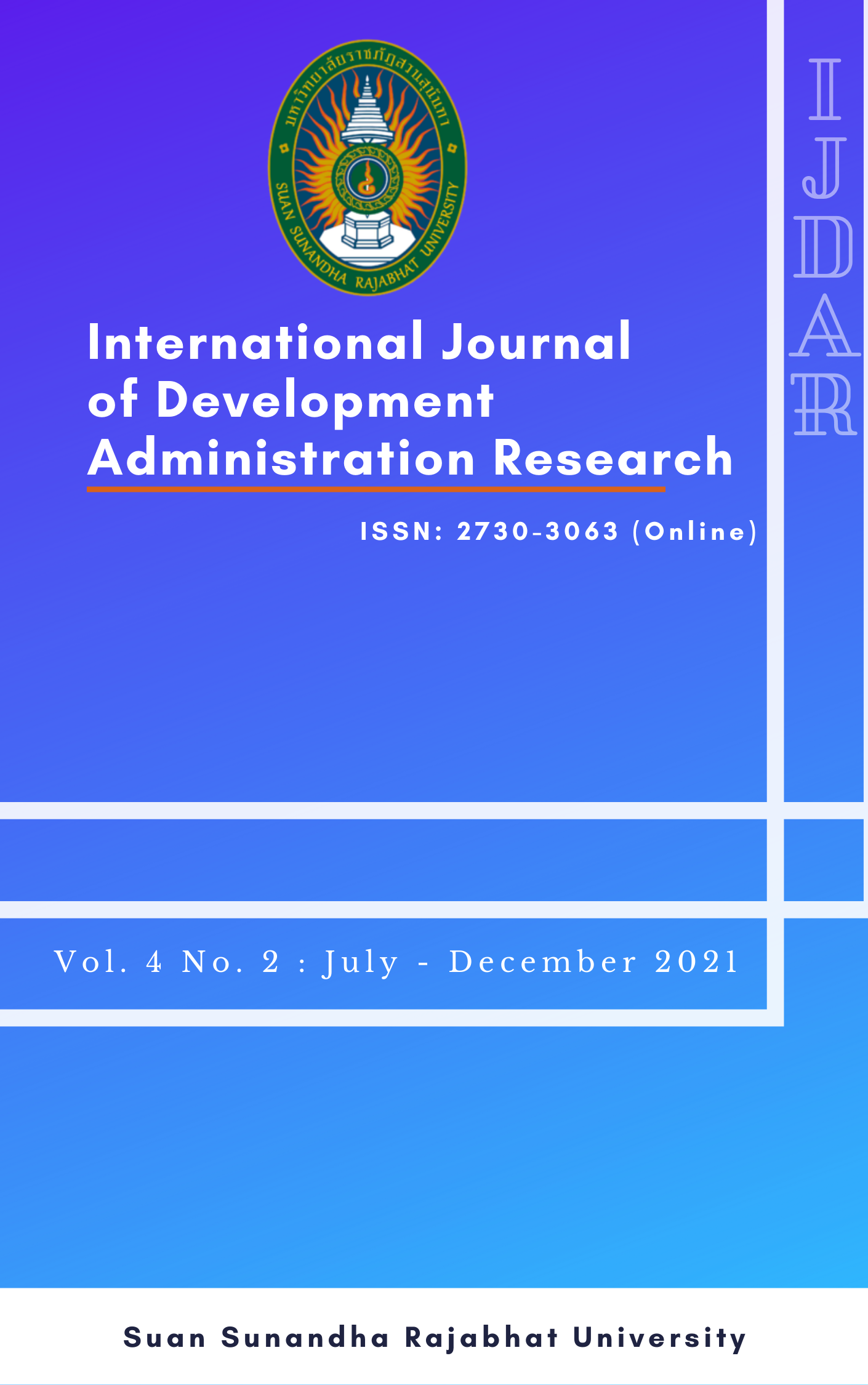Marketing Mix Factors Relating the Selective Decision making on Technology Smart Farmer in Agriculture of Thailand
Main Article Content
Abstract
The research objectives represented 1) to study the marketing mix and the selective decision making. 2) to examine the relationship between the marketing mix and the selective decision making on Smart Farmer. The population was the service recipients of Smart Farmer, the 384 sample size of service recipients were determined by W.G. Cochran formula with the 95 percent of confidence and the 5 percent of error. The research instrument represented the questionnaire and collecting data form the sample that was the service recipients of Smart Farmer on the weekend day only. The data analysis represented descriptive statistical approach by percentage, mean and standard deviation, the statistical correlation analysis represented the correlation coefficient. The finding found that marketing mix factors related with the selective decision making on Smart Farmer in addition the marketing mix factors focused on the six factors of marketing mix as following 1) product 2) place 3) promotion 4) price 5) people 6) process 7) physical environment.
Article Details
License Terms
All articles published in this journal are licensed under the Creative Commons Attribution–NonCommercial–NoDerivatives 4.0 International License (CC BY-NC-ND 4.0).
Under this license, users are permitted to:
- Share — copy and redistribute the material in any medium or format.
Under the following conditions:
- Attribution (BY)
Users must give appropriate credit to the author(s) and the journal, provide a link to the license, and indicate if any changes were made. Attribution must not suggest endorsement by the author(s) or the journal.
- NonCommercial (NC)
The material may not be used for commercial purposes. Any use primarily intended for or directed toward commercial advantage or monetary compensation is prohibited without prior written permission from the copyright holder.
- NoDerivatives (ND)
If users remix, transform, translate, adapt, or build upon the material, they may not distribute the modified material. The work must be shared in its original and unaltered form.
This license ensures that published works remain freely accessible to the academic community and the public, while protecting the integrity of the original research and the rights of the author(s).
For the full legal code of this license, please visit:
https://creativecommons.org/licenses/by-nc-nd/4.0/
References
Opinion Influence in Online Social Media in the Case of Eco-friendly Products. Sustainability, 11(1796), 1-32.
Jaruayporn Kaewsamor. (2008). Factors that buying decision making in the dietary
supplement products in Ayutthaya Province. Independent study in Master of
Business Administration (Business Management). Phranakorn Si Ayutthaya Rajabhat
University.
Chen, D., Wu, B., Chen, T. and Dong, J. (2017). Development of distributed data sharing
platform for multi-source IOT sensor data of agriculture and forestry, Transactions of the Chinese Society of Agricultural Engineering, 33(1), 300–307.
Hang, L., Ullah, I. and Kim, D. H. (2020). A secure fish farm platform based on blockchain for
agriculture data integrity. Computers and Electronics in Agriculture, 170, 105-251.
Jakku, E., Taylor, B., Fleming, A., Mason, C., Fielke, S., Sounness, C. and Thorburn, P. (2019). If
they don’t tell us what they do with it, why would we trust them? trust, transparency and benefit-sharing in smart farming. NJAS-Wageningen Journal of Life Sciences, 90, 100285.
Kotler, P. and Armstrong, G. (2014). Principles of Marketing. (15th ed.). Toronto: Pearson
Prentice Hall.
Kotler, P., and Keller, K.L. (2016). Marketing management. (15th ed.). Upper Saddle River,
New Jersey: Pearson Education.
Lin, Y.P., Petway, J. R., Anthony, J., Mukhtar, H., Liao, S.-W., Chou, C.-F. and Ho, Y.-F. (2017).
Blockchain: The evolutionary next step for ICT e-agriculture. Environments, 4(3), 50.
Natnaporn Eaknarajindawat. (2021). Supporting Factors Affecting Area Development at the
Special Economic Zone Border, Mukdahan Province. Psychology and Education 58(4), 2449-2459
Ubolrat Chomrat. (2016). Factors Affecting Workers Purchasing Decisions of Supplementary
Food Capsule in Bangkok. Independent Study of Master of Business Administration. Bangkok University.
Jersilp, S. (2018), A study of Thai handicrafts ' s souvenir forms That meet the Northern &
Central European tourists ' satification in Rattanakosin Area and Inner Bangkok Zone, Suan Sunandha Rajabhat University, Bangkok.
Mekhum, W. (2016). Eco-technologies and product quality in OTOP2 production: Nonthaburi
province case study. Actual Problems of Economics, 7(181), 256–261.
Tzounis, A., Katsoulas, N., Bartzanas, T. and Kittas, C. (2017). Internet of things in Agriculture,
recent advances and future challenges, Biosystems Engineering, 164, 31–48.


